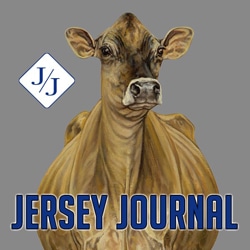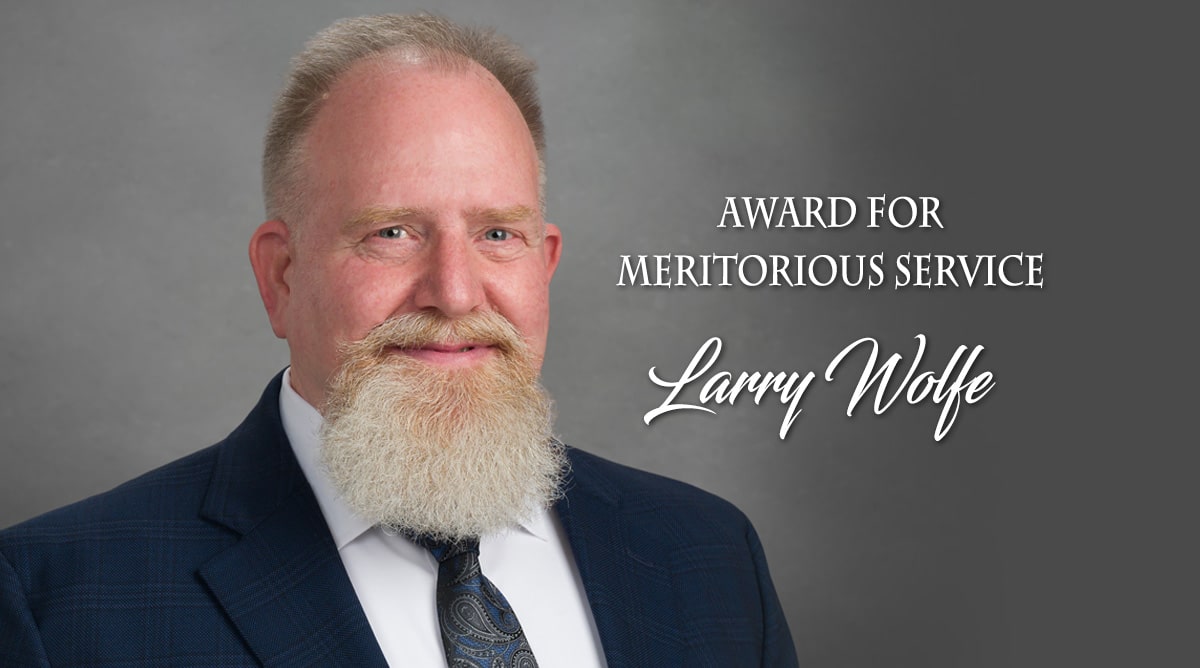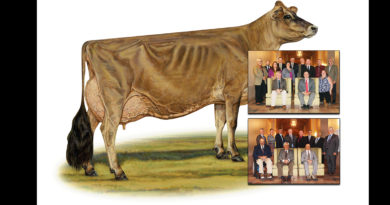Larry Wolfe Honored with Award for Meritorious Service
Larry Wolfe, Reynoldsburg, Ohio, has been named a recipient of the Award for Meritorious Service presented by the American Jersey Cattle Association (AJCA) and National All-Jersey Inc.
This award is given annually to a living individual(s) who, in the joint opinion of the Boards of Directors of the national Jersey organizations, has made a notable contribution to the advancement of the Jersey breed and the livelihood of Jersey owners in the United States through research, education, development, marketing, or other significant activities of the allied dairy industry.
December 1986: At the American Jersey Cattle Club (AJCC), predecessor of the AJCA, registration applications and performance information were keyed into the database. During the year, 50,269 animals were registered, 47,753 cows in 725 herds were on official performance programs, and 34,293 cows in 904 herds were scored. Ohio led the nation in registrations at 3,591, followed by Pennsylvania, New York, Wisconsin, and Tennessee. Jersey sire summaries were published three times a year and snail mail was the mode by which Jersey breeders received herd management reports.
December 2022: Jersey breeders were able to register animals themselves online, use AJCA programs and services on their cell phones, and access a range of electronic documents, including the Green Book. During the year, 122,092 animals were registered, 167,876 cows in 1,097 herds were on official performance programs, and 116,363 cows in 1,648 herds were scored. California led the country with nearly half the registrations, followed by Oregon and Wisconsin. Genotyping was commonplace. Unofficial genomic evaluations were released every week; genetic evaluations were calculated for more than 50 traits.
For the 35-plus years between those two dates, Larry Wolfe was an integral member of the team that created the data-based tools that drove progress and growth at the national Jersey organizations. While he started and ended his career with the title of programmer, a more fitting characterization might be “superhuman” as his impact extended far beyond coding. Larry’s commitment to doing the job right, meticulous attention to details, analytical disposition, willingness to do whatever needed to be done, availability, and personal connection with the Jersey cow and her owners made him a key part of the Jersey success story over the past four decades.
Granted, it took a team. But Larry was the only member of the technology team whose career spanned those dynamic years of information technology. He was the consistency and glue that held everything together through a changing cast of characters working with a shoestring budget and facing never-ending requests to do more with less.
Any good programmer would have been worth their weight in gold. One who knew cows too? Priceless. One who found his way to Jersey headquarters in the late 1980s? Miraculous. It was Larry’s cattle knowledge that positioned the Jersey association time and again to deliver useful, innovative programs for breeders. The association was the first among its peers to offer online registrations, a computerized mating program, free performance progeny reports, and a real-time sire sorting tool.
“Larry joined Jersey headquarters at a pivotal time, when personal computers were in infancy,” noted Dr. John C. Wilk, Raleigh, N.C., professor emeritus at North Carolina State University and recipient of the 1988 AJCC Distinguished Service Award. “He was there from the beginning of the supersonic computer revolution. He learned, created, and developed. And he stuck with it long enough to shape the programs Jersey breeders use on their farms today to manage their herds. He saw what he was doing had value, to the benefit of Jersey breeders around the world.”
At heart, Larry is an analytical guy who milked cows and was, interestingly, a darn good cattle fitter in his early years. The second child and eldest son of 12 siblings, he was born into a family that raised registered Brown Swiss in Chebanse, Ill. He was active in 4-H and FFA and worked on the home farm after graduation while also studying agriculture production and management at Kankakee Community College. In 1971, he was high individual in reasons in Holsteins and Guernseys at a regional post-secondary dairy judging contest.
Over the next 10 years, Larry gained the experience that proved to be indispensable to his future employer in Reynoldsburg. He managed several large, prominent dairy farms, including a pair of Registered Jersey herds, Headspring Farm and Senn-Sational Jerseys, both in Newberry, S.C. He was then a bull herdsman and conducted on-farm A.I. training schools for Illini Sire Service, a custom collection facility in Cornell, Ill. Through it all, he learned the value of data and how it could be used and became familiar with the progeny proving process, from beginning to end.
But it was work at a third progressive Registered Jersey herd in Newberry that things started to come together for Larry. He began working at Bush River Jerseys in 1980 and studying computer programming in 1984. By day, he cared for the herd owned by J.J. “Doc” Malnati and by night drove an hour each way to Piedmont Technical College in Greenwood, S.C. It was during this time too that another event impacted his career, and life—meeting his future bride, Cari Weinberg, AJCC area representative for the Southeast, at the North Carolina State Fair.
The two wed in 1983 and then moved to Raleigh in 1985 to enable Cari to work on an AJCC appraisal project at NC State. Larry completed his business computer programming degree at Wake Technical College and was offered an internship at the Dairy Records Processing Center (DRPC) in Raleigh. There, he was first exposed to information systems that were designed specifically to help dairy owners increase production and improve the farm’s bottom line.
In 1987, the Wolfes moved to the AJCC home office, Larry as computer programmer in the data processing department and Cari as coordinator for Jersey Marketing Service. The late Maurice E. Core was the executive secretary; the late Gene Barton, superintendent of records, was Larry’s supervisor.
At that point, it had been three years since the AJCC moved its data processing from a time-shared bank mainframe to its very own Digital Equipment Corporation (DEC) VAX minicomputer. With this transition now complete and the club’s base systems up and running, Larry was tasked with adding features and processes that would provide greater functionality to the system.
One of his first big projects involved translating the computer code of MAXBULL, the highly acclaimed computerized sire selection tool developed by Virginia Tech, from its original Fortran programming language to the BASIC programming language utilized by the AJCC’s computer. With this update, MAXBULL because accessible to Jersey breeders across the country.
“Across his vocation, Larry faced unique challenges because he had to continually learn on two fronts,” commented former colleague Patty Callahan, Hebron, Ohio, who worked with him in the early years as assistant superintendent of records. “He needed to keep abreast of ever-evolving technology AND ever-evolving needs of Jersey breeders. At this, he was masterful.
“Larry played a huge role in the considerable planning involved with moving the AJCC computer system from the office on Hamilton Road to the new building in Reynoldsburg in 1988. He worked with electricians, DEC, and movers to ensure there was no interruption in operations.”
The major technological advance Larry shepherded came when he had nine years under his belt. In 1997, to keep up with opportunities of the world wide web and the Microsoft Windows operating system, the AJCA board approved replacing the DEC/VMB data processing system with an internet/intranet structure called Member Services Processing System (MSPS).
Board minutes hint at the complexity of this process. The steps involved in “analyzing our current processes (registration, transfer, performance, etc.) and documenting the functionality needed to perform these processes on the new system. . .is time consuming and involves much detail. For example, the registration process involves at least 65 different validation rules.”
The new MSPS system was ultimately revealed to Jersey breeders as infoJersey.com. Jersey breeders could now conduct business with the AJCA electronically ‘round the clock from anywhere.
Among the responsibilities that always landed squarely on Larry’s shoulders were genetic, and later, genomic, evaluations. The task involves interaction and communication with a host of allied industry partners, including the DRPCs, Animal Improvement Programs Laboratory, the Council on Dairy Cattle Breeding (since 2013), and the National Association of Animal Breeders, among others. Thanks to his dairy producer/manager background, Larry was usually the first to notice something “off” in an initial genetic run, necessitating investigation and re-running the evaluation.
“I did not realize what a big deal this was until I headed to Select Sires and was responsible for it myself,” remarked Mark Chamberlain, Fredericktown, Ohio, who worked alongside Larry and managed the technology team for nearly 13 years and is now the enterprise resource planning lead for Select Sires Inc. “I learned how effective Larry was at making things happen and adapting in a timely manner if things went wrong, so business could keep going.”
Larry was the sprocket that kept appraisal data flowing electronically to the database through data collection devices appraisers used on the farm. He sourced the initial “handhelds” and designed the software that enabled type trait evaluations and final scores to be transmitted from the farm.
“Over the years, Larry took countless calls at home from appraisers and area representatives, who were usually non-techies and needed help outside office hours,” Mark continued. “He worked with at least three generations of handhelds and helped generations of programmers understand what they needed to do.
Many other innovative, Larry-coded software programs came from the national Jersey organizations as well, including the first computerized mating program in 1987 and the first software for paperless registration certificates in 1991. He was also the one who ran special queries of data in the database, key for helping staff do their jobs.
Critically, he was charged with incorporating the reams of data that came with the first genomic evaluations in 2009, the discovery of non-Jersey DNA in some Registered Jerseys, and the identification of a pair of undesirable genetic factors—Jersey Haplotype 1 (JH1) and Jersey Neuropathy with Splayed Forelimbs (JNS). To accurately document inheritance, the recording system was initially revised through the Genetic Recovery and Jersey Expansion programs and then replaced with Generation Count and Breed Base Representation in 2015.
“As we worked through the process of DNA discovery and developed tools to help Jersey breeders better understand depth of recorded ancestry, Larry was indispensable,” noted AJCA Executive Secretary Neal Smith, who joined staff as an area representative in 1987 and became CEO of the national Jersey organizations in 2000. “He handled the myriad of changes that were happening at that time with patience and composure. It takes a special person to be placed in a pressure cooker and never ever complain.”
The most recent technological advance taken by the AJCA came at the sunset of Larry’s career. As interim manager of the information technology department for four-plus years, he helmed an infrastructure upgrade that included servers, firewall, network switches, backups and accounting and database software. Larry turned over the reins of the department to Philip Cleary in March 2022.
Larry Wolfe was the right person for the right job at the right time. He used technology to make data sing and served the Jersey breed as a steady presence amidst 35 years of dynamic changes in both the dairy industry and the technological landscape. He played a crucial role in developing innovative programs and tools that enabled Jersey breeders to efficiently manage their herds, improve their cow, and grow the breed.




